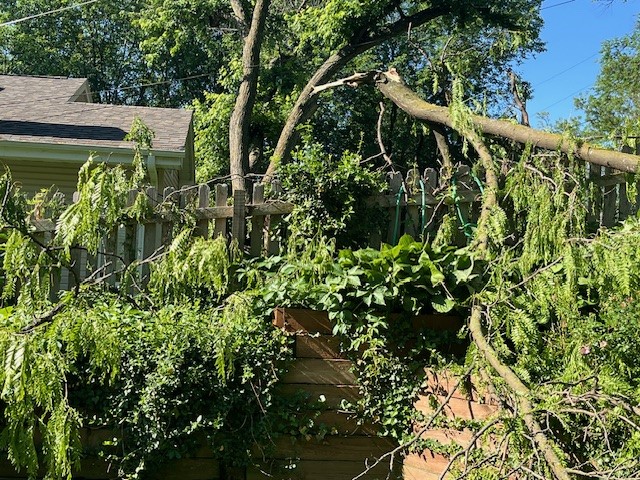
In eastern Nebraska we have seen some incredible weather events this summer – such as the EF-4 tornado on May 23, 2024, and the high winds on July 31, 2024 that knocked out power to over 200,000 OPPD (Omaha Public Power District) customers.
We hear heartwarming stories of neighbors helping neighbors and strangers volunteering time, effort, goods, and money. Unfortunately, we also hear of storm scammers.
OPPD Scams
Just this week, OPPD sent out a warning to people who were still experiencing power outages. Some were receiving calls from aggressive “representatives” demanding payment for restoring power. OPPD suggests hanging up on these callers. If you have questions about billing call402-536-4131 in the Omaha calling area or 877-536-4131 outside of the Omaha area.
OPPD also warned of persons claiming to be from the utility who demand entrance at your door or want to sell you a service. OPPD employees always carry identification, so failure to produce an ID is a sign that the person is actually a scam artist.
Repair Scams
Repairs needed for home and property after a storm also attract a swarm of bad actors. Some are inexperienced opportunists who do shoddy work, and some demand money up front and then disappear.
The Federal Trade Commission points to the following signs of a scam:
- Scammers claim they don’t need to be licensed to do the work.
- Scammers say you’ll get a discount, but only if you sign a contract right away.
- Scammers tell you to sign over your insurance check.
- Scammers ask you to pay for everything up front.
- Scammers insist you pay by wire transfer, gift card, payment app, cryptocurrency or in cash.
- Scammers ask you to sign a “blank contract.”
- Scammers suggest you borrow money from a lender they know.
- Scammers claim they can help you qualify for FEMA relief ― for a fee. (FEMA does not charge application fees.)
A good place to start is with your homeowner’s insurance to find out what coverage you have. They may even have recommendations for reputable companies to do your repairs.
If you have to source your repair company, check out any unknown contractors with online reviews and word of mouth from friends and neighbors. Make sure they are licensed by checking with your state or county government and ask the contractor for proof of insurance. Your local home builders’ association can let you know if there are complaints against a contractor. Get multiple bids, and never sign your insurance check over to a contractor.
Verify the contractor’s identity with photo ID and insist upon a contract. Read the contract thoroughly, and if you don’t understand the terms, find someone such as an attorney who can clarify what you are signing.
Charity Scams
The storm scammers will even use charity as a way to bilk dollars out of well-meaning donors.
The FBI offers suggestions to avoid lining these scumbags’ pockets:
- Give to established charities or groups whose work you know and trust – and don’t believe your caller id if they are reaching out to you for donations!
- Be aware of organizations with copycat names or names similar to reputable organizations.
- Be wary of new organizations that claim to aid victims of recent high-profile disasters.
- Do your research. Use the Federal Trade Commission’s resources to examine the track record of a charity.
- Give using a check or credit card. If a charity or organization asks you to donate through cash, gift card, virtual currency, or wire transfer, it’s probably a scam. Learn more about this trick from the FTC.
- Practice good cyber hygiene:
- Don’t click links or open email attachments from someone you don’t know.
- Manually type out links instead of clicking on them.
- Don’t provide any personal information in response to an email, robocall, or robotext.
- Check the website’s address—most legitimate charity organization websites use .org, not .com.
- Some scammers try to trick you into paying them by thanking you for a donation that you never made.
When you determine a charity is legitimate, the following sites offer reports and ratings about how charitable organizations spend donations and how they conduct business:
The IRS’s Tax Exempt Organization Search tells you if your donation would be tax deductible.
It’s not enough to get clobbered by an extreme weather event. Sometimes you have to fight off the vultures who descend upon the aftermath. So stay vigilant, and enjoy your friends, neighbors and fine weather until the next storm event.
-

Jeffrey F Putnam is a personal injury attorney and workers compensation attorney located in Omaha, Nebraska.
View all posts

